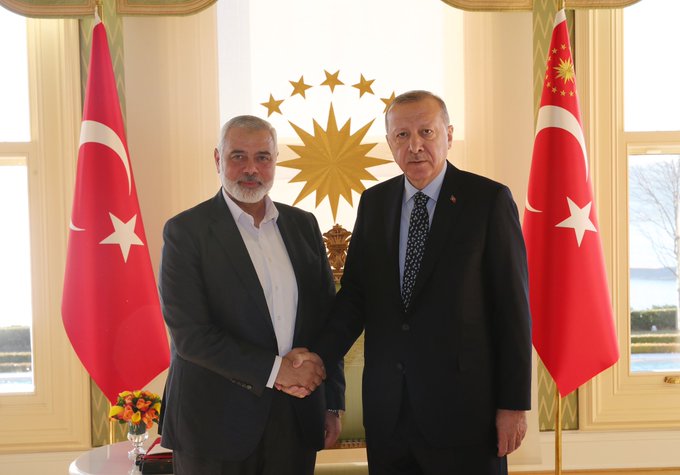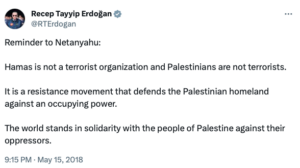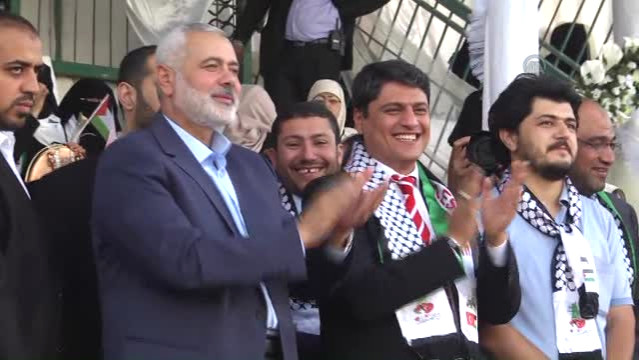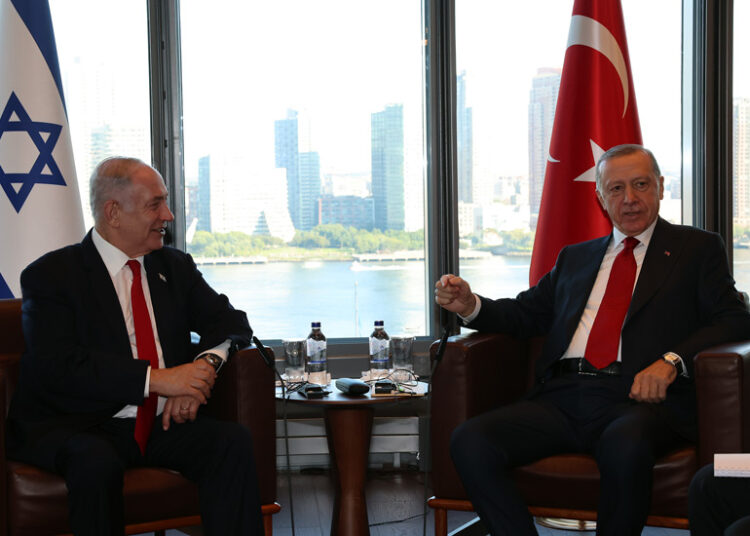Levent Kenez/Stockholm
Turkish President Recep Tayyip Erdogan, unlike other Islamist leaders, is employing a measured tone amid the war caused by Hamas’s large-scale, surprise attack on Israel on October 7. In contrast to his past remarks during tensions between Israel and the Palestinians, where he had strong words for Israel and Prime Minister Benjamin Netanyahu, Erdogan is now calling on both sides equally to cease violence.
On Saturday, just a few hours after the start of Hamas’s attacks, President Erdogan addressed his party’s congress and stated, “In light of the events that took place in Israel this morning, Turkey calls on all parties to exercise restraint and refrain from provocative actions that could further escalate tension.”
During a speech on Sunday at the inauguration of the Mor Efrem Syriac Orthodox Church, Erdogan emphasized that the root cause of all the problems in the region is the Palestinian issue. He said until this issue is equitably resolved, the region will continue to long for peace. He further said achieving lasting peace in the Middle East is only possible through a final resolution of the Israeli-Palestinian conflict.
Erdogan expressed his concerns, stating, “Unfortunately, as long as we are delayed in establishing justice, the price is paid not only by the Palestinians and Israelis but by the entire region. The deaths and suffering of innocent children, even babies in their cradles, deeply touch all of our hearts. Adding fuel to the fire benefits no one, especially not the civilians on both sides.”

“Turkey is ready to do everything in its power to put an end to the conflict and reduce the escalating tension brought by recent events. We are determined to intensify our diplomatic efforts to restore calm. We invite all influential actors in the region to contribute sincerely to peace,” he added.
In a phone call on Monday with Israeli President Isaac Herzog, Erdogan emphasized the importance of acting with common sense and quickly establishing peace in the region, according to the state-run Anadolu news agency.

In 2018 Erdogan was involved in a public dispute with Netanyahu, characterizing Hamas as a resistance organization fighting against the occupying Israeli forces.
The improved relations between Turkey and Israel, which began in 2021 and were further advanced by Herzog’s visit to Ankara in March 2022, have led to a notable shift in Turkey’s rhetoric. Turkey has moved away from its previously aggressive and accusatory language towards Israel as well as from its criticism of Israel’s security operations in the Palestinian territories.

A study conducted by Nordic Monitor that analyzed Erdogan’s social media posts and speeches, statements from the Ministry of Foreign Affairs and pro-government media reports, indicates that the Turkish government is adopting a more cautious approach and is refraining from directly targeting Israeli authorities.
In the past Erdogan frequently used strong language, such as “Israeli oppression,” “Israeli terrorism” and “terrorist state,” in his speeches addressing the Palestinian and Gaza issues. This change in tone reflects the evolving dynamics in Turkey’s foreign policy and its approach to the Israeli-Palestinian conflict.
Observers attribute Erdogan’s change in stance to several factors. Firstly, the shocking images of violence and civilian casualties resulting from Hamas’ terrorist attacks have put Erdogan in a difficult position, especially when compared to previous incidents.
President Erdogan, known for his close ties to Hamas and for allowing Hamas leaders to operate freely in Turkey, appears to be making preemptive efforts to mitigate potential pressure from the West due to the increasing backlash against Hamas. Erdogan’s recent actions, including his meeting with Hamas Political Bureau Chief Ismail Haniyeh in June in Ankara and his discussions with Palestinian President Mahmoud Abbas, suggest a desire to navigate this situation strategically. Observers noted the warmth and cordiality between Erdogan and Haniyeh during their last meeting.
Israel has persistently demanded the closure of Hamas’s office in Istanbul, a request that has not been heeded up to this point. According to a covert operation reportedly leaked to the local media by Turkish intelligence agency MİT on July 3, it was claimed that an Israeli Mossad operation targeting a network linked to Hamas front organizations operating in Turkey had been thwarted. Details in the reports confirmed a substantial and active Hamas presence in Turkey.
It is no secret that Turkey has provided support to Hamas through its government organizations and pro-government charities operating in Gaza. Nordic Monitor previously reported in 2021 that the state-run Turkish Cooperation and Development Agency (TİKA) had allegedly transferred funds, allocated from discretionary funds, to its Gaza office for potential use by Hamas. According to a senior bureaucrat who had worked at the now-abolished Turkish Prime Ministry and spoke anonymously due to concerns over the government’s treatment of critics and whistleblowers, TİKA employees who conducted official visits to Gaza for project monitoring were provided with extra travel allowances from secret discretionary funds. They were instructed by their supervisors to leave all the cash at TİKA’s Gaza office without obtaining a receipt, potentially for it to be handed over to Hamas.
Erdogan’s choice of a diplomatic tone can also be attributed to another reason, which is Turkey’s ongoing economic challenges. Turkey has been seeking investment and financial resources from the West, and given the country’s close ties with Moscow during the Russian-Ukrainian war, Erdogan knows that further tensions with Israel could send too negative a signal. Additionally, Erdogan is aware of the improving relations between Israel and several Gulf countries, particularly Saudi Arabia, which have been involved in financial and investment initiatives. In this context, he may prefer not to sour relations with these countries during a time when Turkey is seeking external support. Moreover, with Erdogan gradually improving relations with Egypt and Saudi Arabia, there isn’t a favorable environment for him to assert himself as leader of the Muslim world
Furthermore, adding another issue to the already troubled relationship with the United States wouldn’t bode well for Turkey, which is struggling to maintain the value of the lira to the dollar at a certain level.
Indeed, Erdogan’s re-election in May, securing another five years as president, provides him with the stability needed to approach the Israel issue cautiously. For now, he may not find it necessary to make bold statements against Israel for his nationalist and Islamist base. However, he must also consider that any dramatic images or developments arising from Israel’s counterattacks could potentially increase pressure from his grassroots and necessitate a more assertive stance. Balancing these political considerations will be a significant factor in Turkey’s approach to the Israel-Palestine conflict in the coming days.












